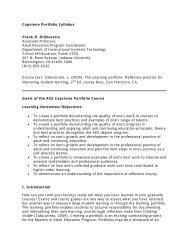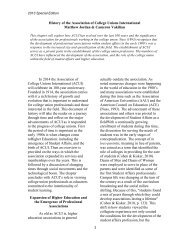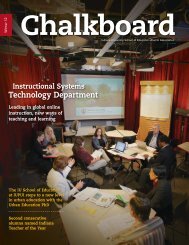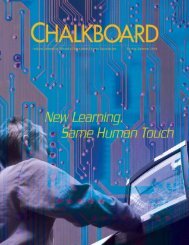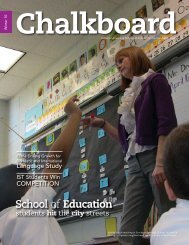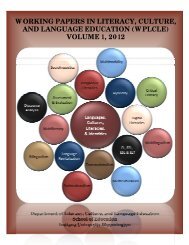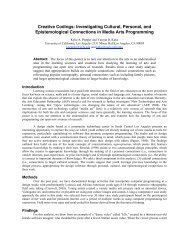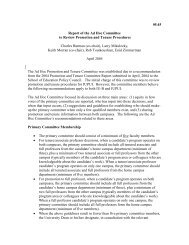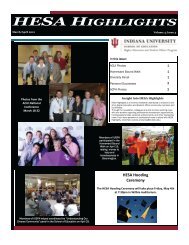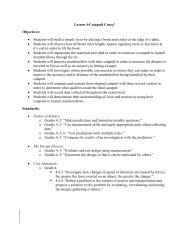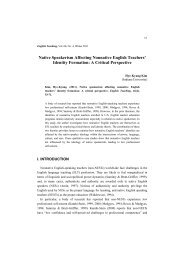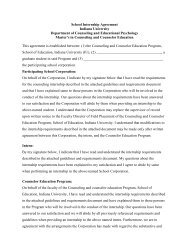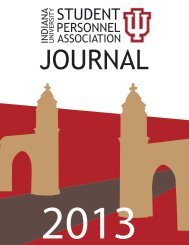Chalkboard Winter 2009 - School of Education - Indiana University
Chalkboard Winter 2009 - School of Education - Indiana University
Chalkboard Winter 2009 - School of Education - Indiana University
You also want an ePaper? Increase the reach of your titles
YUMPU automatically turns print PDFs into web optimized ePapers that Google loves.
News Briefs<br />
The <strong>Indiana</strong>polis Foundation has<br />
granted $65,000 to the IU <strong>School</strong><br />
<strong>of</strong> <strong>Education</strong> at IUPUI for “Project<br />
Impact,” a program that will formally<br />
connect faculty, students, and resources<br />
<strong>of</strong> the school to the centers. The<br />
partnership is designed to increase<br />
neighborhood center capacity to support<br />
academic learning and child development,<br />
particularly in the areas <strong>of</strong> science<br />
and mathematics education.<br />
Under the program, the <strong>School</strong> <strong>of</strong> <strong>Education</strong><br />
and neighborhood centers will<br />
work together to provide pr<strong>of</strong>essional<br />
development activities with center staff.<br />
IUPUI teacher-education students will<br />
participate in service-learning projects<br />
at the neighborhood centers. Instructional<br />
technology staff at the <strong>School</strong> <strong>of</strong><br />
<strong>Education</strong> will analyze how to best use<br />
technology for communication and<br />
collaboration between the centers and<br />
the school.<br />
The idea for the program grew from<br />
conversations between neighborhood<br />
center staff and IU faculty already working<br />
with the centers. “The funding from<br />
the <strong>Indiana</strong>polis Foundation allows us to<br />
formalize and expand our partnership<br />
with area neighborhood centers,” said<br />
Pr<strong>of</strong>essor <strong>of</strong> Secondary Special <strong>Education</strong><br />
Pat Rogan, who became executive<br />
associate dean on July 1. “The work is a<br />
‘win-win’ as we prepare future teachers,<br />
enhance civic engagement, and invest<br />
in area youth and their families.”<br />
<strong>Indiana</strong> governor Mitch Daniels has<br />
named a doctoral student in the IU<br />
<strong>School</strong> <strong>of</strong> <strong>Education</strong> to serve on the<br />
<strong>Indiana</strong> Commission for Higher <strong>Education</strong>.<br />
Clayton Slaughter, a doctoral<br />
student in the Higher <strong>Education</strong> and<br />
Student Affairs Program who also holds<br />
a degree from the IU <strong>School</strong> <strong>of</strong> Law —<br />
Bloomington, is serving a two-year term<br />
Clayton Slaughter<br />
that expires on June 30, 2010. A student<br />
nominating committee recommended<br />
Slaughter for the appointment. By law,<br />
one member <strong>of</strong> the commission must be<br />
a student representative.<br />
“This is a chance for me to learn more<br />
as a student,” Slaughter said. “This is a<br />
chance to me to give back and show to<br />
the commission, ‘this is what I’ve learned<br />
in almost nine years <strong>of</strong> college.’”<br />
IU teachers make good hires<br />
CHUCK CARNEY<br />
Most principals think highly <strong>of</strong> the teachers they’ve hired from IU, according to a new study commissioned by the <strong>Indiana</strong><br />
<strong>University</strong> <strong>School</strong> <strong>of</strong> <strong>Education</strong>. The study <strong>of</strong> 112 principals covered opinions on 139 graduates from the Bloomington<br />
campus between 2003 and 2006.<br />
The Center for Evaluation and <strong>Education</strong> Policy (CEEP), <strong>Indiana</strong>’s leading non-partisan education policy research center<br />
and part <strong>of</strong> the IU <strong>School</strong> <strong>of</strong> <strong>Education</strong>, conducted the study as part <strong>of</strong> a continuing effort to contribute to the knowledge<br />
base that the school uses to improve the quality <strong>of</strong> pre-service teacher education. The study was designed to answer two<br />
questions: In the opinion <strong>of</strong> the principals, how well prepared are teachers who are graduates <strong>of</strong> the IUB SOE? What are<br />
the strengths and weaknesses <strong>of</strong> the IUB Teacher <strong>Education</strong> Program?<br />
Among the findings about IUB graduates:<br />
• Principals think IUB graduates are stronger in selected teaching skills compared to graduates <strong>of</strong> other teacher<br />
preparation programs.<br />
• Principals are more positive about IUB graduates’ performance compared to that <strong>of</strong> graduates <strong>of</strong> other teacher<br />
preparation programs they’ve recently hired.<br />
• A majority <strong>of</strong> teachers were assigned to teach in the areas for which they were prepared at the IUB SOE.<br />
• In the area <strong>of</strong> content knowledge, both elementary and secondary education teachers were found to be well prepared to<br />
teach their subjects.<br />
• In regard to knowledge using effective instructional strategies, teachers were found to be prepared strongly or excellently.<br />
• Principals were pleased with IUB graduates’ performance in providing personalized learning for students compared to<br />
graduates <strong>of</strong> other teacher education programs.<br />
• Principals were asked how well IUB graduates provide meaningful experience by managing the classroom environment<br />
to maximize learning. When examined by school size, locale, and school level, graduates performed best in urban fringe<br />
areas at both elementary and secondary schools.<br />
<strong>Chalkboard</strong> • 5



